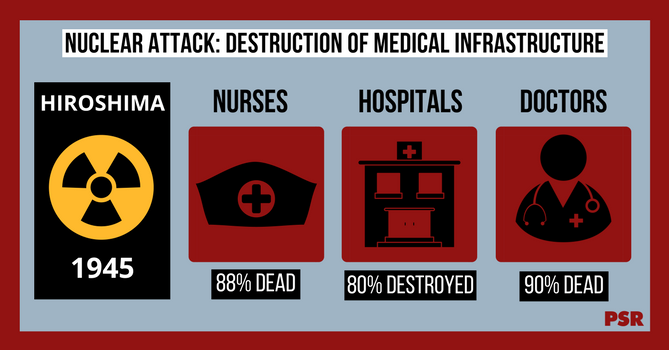Nuclear Disarmament & Public Health
The Health and Humanitarian Case for Nuclear Disarmament
Physicians and health professionals are leaders in advocating for public health solutions to growing nuclear weapons dangers in our world today. A medical response to a nuclear attack would be inadequate—any use of nuclear weapons would have devastating health, humanitarian and environmental consequences.
Prevention is the Only Cure
Physicians and health professionals warn that a meaningful medical response to any use of nuclear weapons would be impossible. We can’t prepare for nuclear war, we must prevent it.
A nuclear attack on any city would destroy hospitals and clinics, kill the vast majority of health professionals, wipe out medical supplies, and paralyze communication and transportation systems.
International health federations, including the World Medical Association, International Federation of the Red Cross, International Council of Nurses, and World Federation of Public Health Associations, have officially endorsed the Nuclear Weapons Ban Treaty on the basis that a meaningful medical response to any use of nuclear weapons would be impossible.
Regional Nuclear War, Global Health Impacts
Nuclear war is ecocidal.
Scientific studies demonstrate that a regional nuclear war would have planetary impacts on the climate and global health. PSR’s report, Nuclear Famine: 2 Billion at Risk?, offers scientific data on the climatic impacts of a regional nuclear war armed with less than one percent of the global nuclear stockpile.
Scientific modeling demonstrates that such a regional nuclear war armed with 100 Hiroshima-sized nuclear bombs would loft enough soot into the atmosphere to dramatically disrupt the climate and have long-term impacts on worldwide agricultural production. The resulting global famine would put 2 billion people at risk of starvation.
Beyond the Blast
Nuclear weapons inflict devastating health harms to civilians even before a bomb is dropped.
Nuclear weapons activities, including their use, production, testing, and waste storage, release ionizing radiation. In addition to the wartime citizens of Hiroshima and Nagasaki, workers, veterans, and civilians living near nuclear weapons sites have been exposed to radiation and suffer acute and long-term illnesses. These illnesses are often lethal and have inter-generational health effects.
Illnesses from radiation exposure from nuclear weapons activities include:
- Leukemia
- Multiple myeloma
- Stomach, colon, lung, breast, and thyroid cancers
- Cataracts
- Birth defects
- Infertility
- Chromosomal aberrations
- Hemorrhaging
- Infections
